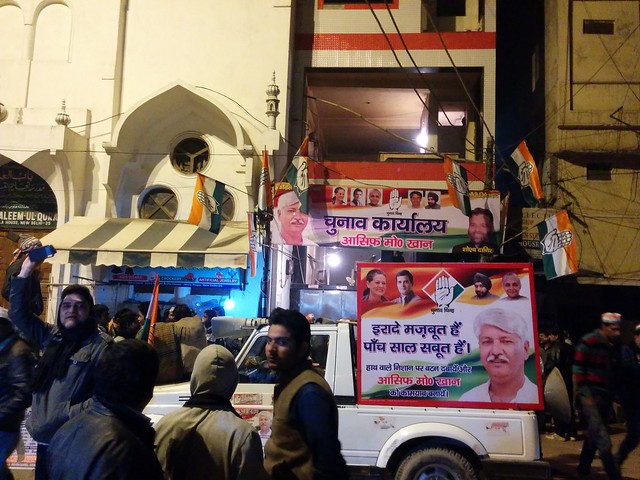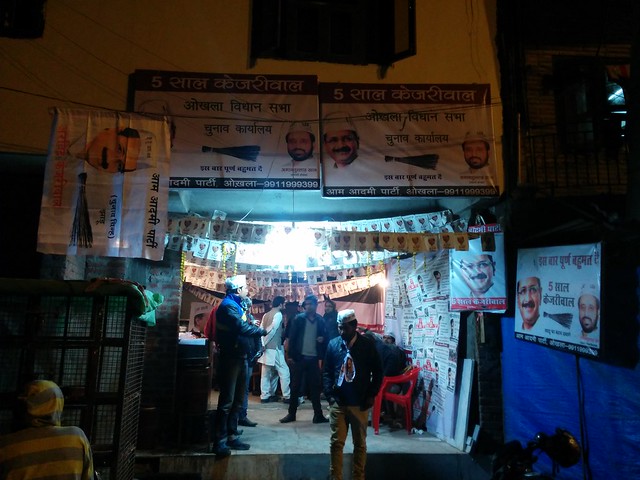Little more than 2-year-old party has emerged as a popular choice replacing the grand old party, a traditional favourite
By Nivedita Bhardwaj, TwoCircles.net,
New Delhi: The then infant Aam Aadmi Party (AAP) had made the traditional equation of ‘Congress-versus-BJP’ in the national capital into a tripartite fight in 2013 Delhi assembly election and by 2014 Lok Sabha elections, the AAP had turned the fight bilateral again, this time as ‘BJP-versus-AAP’, rendering the Congress irrelevant.
It becomes interesting to check what will the 2015 Delhi assembly poll bring on table? A small yet decisive role will be played by the Muslim community depending on whether it votes for the Congress or expresses full confidence in the AAP. Muslim votes, especially in the 10-odd constituencies of the total 70, will surely influence the outcome and decide if Congress has been able to wean back the vote share it lost to AAP during the last two elections.

Muslim demography in Delhi:
In 2013, disillusioned with the Congress, not very sure of the BJP and especially charged after the 2011-12 anti-corruption ‘Anna andolan’, the Arvind Kejriwal led Aam Aadmi Party (AAP) had occupied the urban mindscape – both educated, middle class, salaried people and economical weaker sections, labour colonies and jhuggi jhompri clusters – and it marked a spectacular debut with 28 seats in the 70 member house.
But the Muslim dominated seats still remained with the Congress. Of the eight seats that the grand old party retained, four were from the Muslim dominated areas.
Delhi has almost 12 % of Muslim voters (population as per 2011 Census). Of the 70 assembly constituencies in Delhi, there are five seats where Muslims account for almost or sometimes little over 40% of total population and hence are able to swing results. These are Chandni Chowk, Matia Mahal, Ballimaran, Okhla and Seelampur.
In 2013 December assembly elections, the BJP could not win a single seat of these five. Congress won four while Matia Mahal went to Shoiab Iqbal (who fought on Janata Dal (U) ticket), who now has joined Congress and contesting from the same constituency. During Lok Sabha 2014 election, Muslims voted for AAP in large numbers, which resulted in division of Muslim votes between AAP and Congress.
Then there are five other seats where Muslims form between 30-40% of the total population. These are Mustafabad, Babarpur, Seemapuri, Shahdara and Rithala. Here too, things changed from 2013 assembly election to 2014 Lok Sabha elections and saw division of votes.
From 2013 to 2015:
Unlike in 2013, when AAP was considered a rookie and both the Congress and the BJP spectacularly failed to even acknowledge its presence – the result being both were caught off guard with the deep inroads that the Kejriwal-led party had made into Delhi – the traditional parties have geared up to its presence in 2015.

So, on the one hand, if the BJP has poured its entire star cast ensemble – 120 MPs, neighbouring chief ministers, central cabinet ministers and even the Prime Minister himself – the Congress too has not spared any efforts –vice president Rahul Gandhi’s road shows and rallies, president Sonia Gandhi’s rallies and even distributing pamphlets after Juma prayers warning Muslims how every vote to AAP will go to consolidate BJP.
Muslims, as the trends across India have shown, are voting more and more for candidates put up by parties run by and run for Muslims. But Delhi has not offered any such serious option for the community. There are only a few candidates put up by Indian Union Muslim League (IUML). The Peace Party of India had put up one candidate but on January 30, the PPI’s Delhi unit merged with the AAP.
The All India Majlis-EIttehadul Muslimeen (AIMIM), the Social Democratic Party of India (SDPI) and the Welfare Party of India (WPI) have stayed out of the Delhi elections, leaving the Muslims hardly any choice: the obvious choice of either the Congress or the AAP. Interestingly, the BJP has been claiming that there is a good part of the community that is voting for the saffron party since 2013.
Possible pattern on February 7:
The Delhi-based Centre for Study of Developing Societies (CSDS) analysed the post-poll polling pattern in 2013 and 2014 for Delhi. In 2013, it indicated that 53% of the Muslim voters chose Congress. In 2014, this share came down to 39% for the Congress and a whopping 56% Muslims voted for the AAP, resulting in clear division of votes in some assembly constituencies.
“The probability of it (voting, added) being in favour of AAP is greater and strengthened by the fact that AAP secured more votes than the Congress in each of the 10 segments with high Muslim concentration during the Lok Sabha elections. Young Muslim voters played an important role in giving AAP an advantage over the Congress in Muslim areas,” Sanjay Kumar, Shreyas Sardesai and Pranav Gupta wrote – based on CSDS analysis – published by the Economic Times on January 26.
“The CSDS survey reveals that whereas AAP and Congress were neck and neck among elderly Muslim voters in 2014, among young Muslims (18-35 years), AAP led the Congress by nearly 30 percentage points. With a decisive swing of Muslim voters towards it and possible fragmentation in the non-Muslim wards, AAP is likely to win most of the Muslim-concentrated seats in this election,” the authors have predicted.
The survey/study is basing its predictions entirely on the fact that Congress is still appearing as weaker party but, notwithstanding the fact that there are scores of things that ‘more than meets the eye’ during an election – such as local civic issues and candidate’s own credibility, essentially on the ground situation rather than theoretical analysis.

“This tentative shift of Muslim votes towards AAP in 2014 could well intensify and become more definite in the upcoming assembly elections as the Congress has been unable to stage a recovery and AAP has emerged as the main alternative to the BJP in Delhi. The only thing that could perhaps work in favour of the Congress is that the party has renominated all its four Muslim MLAs, who were elected in 2013. Their local influence may arrest the Muslim drift towards AAP, particularly if they are seen to be in a better position than the AAP candidates to take on the BJP,” the authors claim.
But a field visit to areas dominated by Muslims reveals that the MLAs repeated by Congress face a severe anti-incumbency. For instance, Mateen Ahmed from Seelampur has been winning since 1998 and was among the eight MLAs of Congress to retain his seat in 2013. But voters from areas such as Jaffrabad, a core area from his constituency, are indicating that they are ready to consider AAP. Congress was able to retain its seat year after year only because the Muslim-dominated constituency had no choice. Now they have.
Related:
